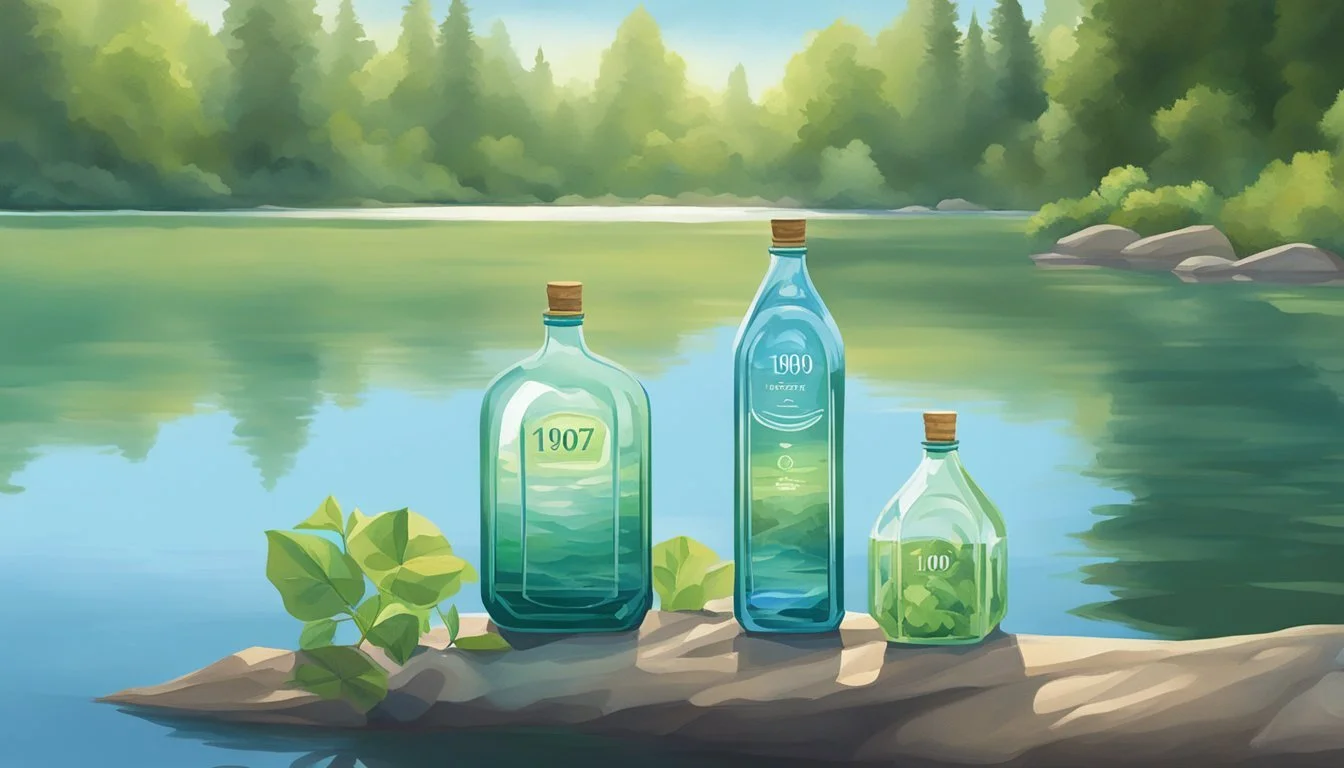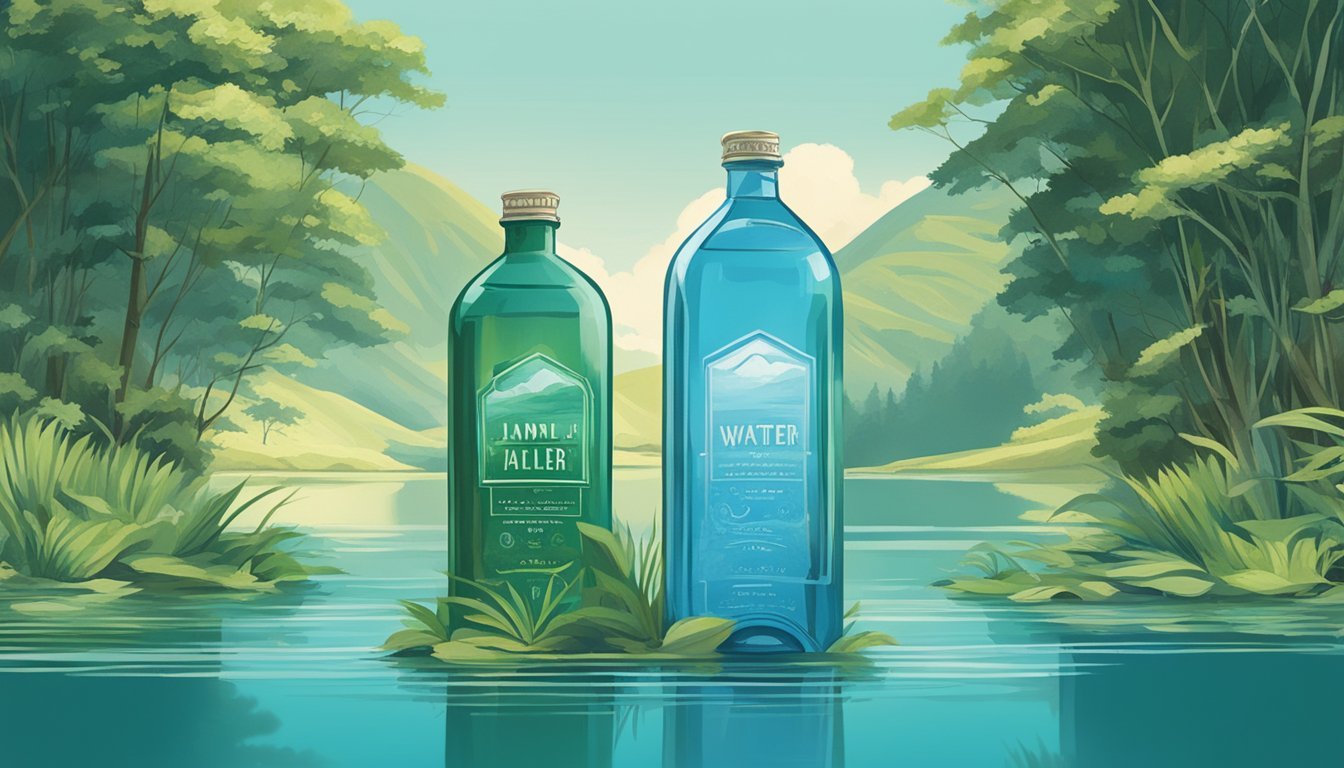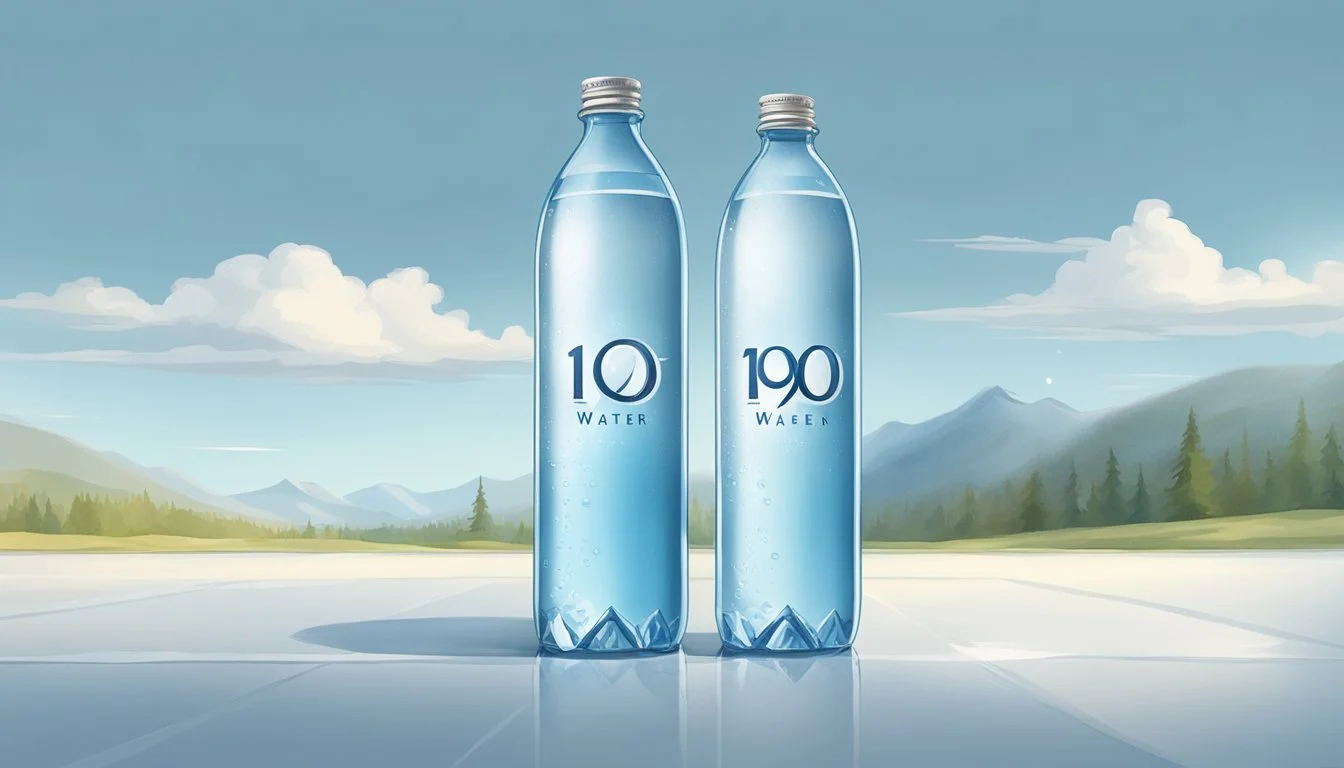1907water vs. Crystal Lake
The Ultimate Bottled Water Comparison
When it comes to bottled water, the options seem endless, but two brands stand out for their unique qualities: 1907water and Crystal Lake. Both are popular choices among consumers, each offering something slightly different. Crystal Lake, put out by Rite Aid, boasts a premium taste similar to that of Smartwater, though it comes with a slightly saccharine flavor.
1907water is renowned for its clean, crisp taste and New Zealand origins, setting it apart as a high-quality option. The debate between these two brands often centers on their taste and overall consumer satisfaction. Whether you're concerned about flavor, purity, or brand reputation, our comparison aims to help you make an informed choice.
There's more to these bottles than just H2O. What distinguishes them extends beyond the water itself to packaging, sourcing, and even marketing. By comparing the strengths and weaknesses of both 1907water and Crystal Lake, you can decide which aligns more closely with your needs and preferences.
The Importance of Water Quality and Sources
Water quality and source type are critical when choosing bottled water. Understanding the distinctions between different types of water helps in making informed decisions.
Understanding Bottled Water
Bottled water can vary greatly based on its source and treatment processes. Spring water comes from underground formations and must flow naturally to the surface. It is often marketed as being healthier due to its natural mineral content.
Purified water, on the other hand, originates from any water source, including tap water, but undergoes processes like reverse osmosis, distillation, or deionization to remove impurities. While this makes purified water extremely clean, it may lack the natural minerals found in spring water.
Consumers should check labels to identify the source and type of water.
Comparing Spring Water and Purified Water
Spring water like 1907Water is often sought after for its natural purity and mineral content. This type of water usually comes from mountain springs and is considered to have superior taste and health benefits due to the presence of natural minerals.
Purified water, such as Crystal Lake, is praised for its rigorous purification methods that ensure the removal of contaminants. This water type is ideal for those who prioritize safety and purity over mineral content.
While both types offer clean hydration, their differences in taste, mineral presence, and source materials could influence personal preference. Consumers might prefer spring water for minerals and taste, while others choose purified for its extensive filtration process.
1907water and Crystal Lake: Brand Overviews
1907water and Crystal Lake offer uniquely different bottled water products, each with distinct origins and production methods. Understanding these differences can help consumers make informed decisions.
1907water: Origin and Production
1907water originates from an ancient artesian source in New Zealand. This source is estimated to be around 50,000 years old, providing naturally alkaline water that continuously rises to the surface.
The water is bottled at the source in New Zealand, ensuring minimal processing and maintaining its natural qualities. The company emphasizes the purity and natural balance of its water, presenting it as a remedy for modern life's stresses. Additionally, 1907water has recently introduced sparkling artesian water bottled in glass, collaborating with local New Zealand artists like FLOX to enhance its aesthetic appeal.
Crystal Lake: Company Profile and Practices
Crystal Lake is a premium bottled water brand produced by Rite Aid. The brand is known for its high-quality standards and purified taste, resembling that of Smartwater. The packaging of Crystal Lake is designed to be appealing and similar to other premium brands.
The production process of Crystal Lake involves rigorous purification to ensure a consistently clean and crisp taste. Although the brand's name might evoke diverse associations, its main selling point is the quality and reliability of the water. Crystal Lake aims to provide a premium experience through its stringent production practices and thoughtful packaging.
Health Considerations in Bottled Water
Choosing the best bottled water involves considering both hydration benefits and potential health risks.
Hydration and Health Benefits
Bottled water brands like 1907water and Crystal Lake both offer reliable sources of hydration. Proper hydration is crucial for bodily functions including digestion, circulation, and temperature regulation. Bottled water can be a convenient option for those seeking clean and accessible hydration.
Some bottled waters contain beneficial minerals like calcium and magnesium, which support bone health and muscle function. Alkaline water varieties claim to balance body pH and improve hydration efficiency; however, these claims require more scientific validation.
Contaminants such as PFAS chemicals and heavy metals like lead and arsenic are important health considerations. Consumers should check for certified testing of their bottled water to ensure safety from such contaminants.
For safer choices, selecting bottled water with transparent safety reports and free from BPA in packaging can reduce the risk of chemical exposure. By balancing hydration needs with these health considerations, consumers can make more informed decisions about their bottled water preferences.
Environmental Impact of Bottled Water
The production and consumption of bottled water involve several environmental factors. These can be broken down into the sustainability of the packaging materials and the ecological consequences of water extraction.
Sustainability and Bottle Materials
The type of material used in bottled water packaging significantly impacts the environment. Plastic bottles, typically made from polyethylene terephthalate (PET), are prevalent due to their low cost and convenience. However, they lead to substantial plastic waste and have a high carbon footprint due to the energy-intensive production process.
In contrast, glass bottles, while heavier and more costly to transport, are often considered more environmentally friendly. Glass is 100% recyclable and can be reused without degrading in quality. The choice between plastic and glass involves a trade-off between economic and environmental factors, with glass offering greater sustainability benefits.
Water Extraction and Its Ecological Effects
Extracting water for bottling can have significant ecological repercussions. Bottled water companies often source water from groundwater reserves or natural springs. This can lead to the depletion of local water sources, impacting both ecosystems and communities. Over-extraction can lower water tables, affecting plant life and reducing the availability of water for other uses.
Additionally, the transportation of bottled water contributes to carbon emissions, exacerbating environmental concerns. When considering the environmental impact of bottled water, the effects of water extraction and the associated logistical operations cannot be overlooked. These factors combine to create a complex environmental footprint that extends beyond just the packaging materials.
Taste Profile and Water Sommelier Insights
When comparing 1907water and Crystal Lake, it is crucial to examine their taste profiles and insights from water sommeliers. These experts highlight the nuances that each brand brings to the palate.
Palette of Bottled Water
1907water, sourced from New Zealand, is appreciated for its silky smooth texture and balanced mineral content. Tasters often note a subtle hint of sweetness and a crisp, clean finish. This makes it an excellent choice for those seeking a refreshing and light drinking experience.
Crystal Lake, on the other hand, has a robust and earthy profile. It is often described as having a mineral-rich taste due to its high calcium and magnesium content. Some may find its finish to be heavier, which can be appealing to those preferring a more pronounced flavor.
Expert Recommendations
Water sommeliers like Martin Riese point out that not all water is created equal. They recommend 1907water for its purity and smoothness, especially suited for pairing with delicate foods or enjoying on its own.
Crystal Lake is praised for its distinctive mineral profile. Sommeliers might suggest it for those who enjoy fuller flavors, making it a great complement to richer dishes. Both brands offer unique experiences, but the preference largely depends on the drinker's palate and the occasion.
Consumer Preferences and Brand Perceptions
Consumers often choose bottled water brands based on perceived quality, flavor, and brand reputation. Preferences vary widely, influenced by factors such as marketing, taste tests, and pricing.
Popular Bottled Waters on the Market
Popular bottled water brands like Dasani, Aquafina, Evian, Fiji, Essentia, and Smartwater dominate the market. Each brand focuses on distinct selling points—Fiji emphasizes its natural artesian source, while Smartwater highlights its vapour-distillation process.
Nestlé and Arrowhead offer a range of mineral-rich options. Voss and Icelandic Glacial appeal to consumers seeking premium, aesthetically pleasing packaging. Acqua Panna is renowned for its smooth taste sourced from Tuscany. Additionally, Poland Spring and Core Hydration cater to regional and health-conscious demographics, respectively.
Brand Loyalty and Consumer Trust
Brand loyalty in bottled water is often built through sustained marketing efforts and a consistent product experience. Evian and Fiji exemplify this, leveraging imagery of pristine sources to cultivate trust. Aquafina and Dasani, produced by major beverage companies, benefit from established brand networks enhancing consumer confidence.
Consumers associate brands like Smartwater and Essentia with enhanced hydration through added electrolytes, fostering loyalty among fitness enthusiasts. Voss and Icelandic Glacial attract consumers who prioritize luxury and sustainability. Trust is critical, as demonstrated by Poland Spring’s strong regional identity and Core Hydration's balanced pH claims.
Regulatory and Industry Standards
Ensuring the safety and quality of bottled water involves rigorous regulations and certifications that help maintain consumer trust. Varied protocols and standards guide these efforts on federal, state, and industry levels.
Bottled Water Certifications
Bottled water must adhere to multiple certification standards to ensure safety and quality. The FDA oversees bottled water regulations under the Federal Food, Drug, and Cosmetic Act, ensuring compliance with safety standards. Bottled water must meet stringent criteria for contaminants like lead, which is capped at 5 ppb.
The International Bottled Water Association (IBWA) sets additional voluntary standards. Members of the IBWA often surpass federal requirements, implementing third-party audits, and adhering to strict HACCP (Hazard Analysis and Critical Control Points) protocols. This commitment underscores the importance of third-party certifications in maintaining high-quality bottled water.
Monitoring and Compliance
Compliance with bottled water standards is continuously monitored. The FDA conducts periodic inspections and requires robust record-keeping by manufacturers. Producers must test for contaminants and report findings to the FDA, ensuring traceability and transparency.
States may impose further regulations, enhancing safety through local oversight. The IBWA also plays a crucial role, mandating annual inspections and random testing among its members. These measures collectively ensure that bottled water sold to consumers meets high safety and quality standards without compromise.
Comparative Analysis
When evaluating 1907water and Crystal Lake, critical factors to consider are quality and pricing. Both brands are widely available in grocery stores, adding to their accessibility.
1907water vs. Crystal Lake: Quality Comparison
1907water is known for its high purity, sourced from a pristine aquifer in New Zealand. It boasts a naturally balanced pH and a crisp, clean taste. The packaging mirrors quality – sleek and minimalist.
Crystal Lake, produced by Rite Aid, mimics premium brands like Smartwater. Although marketing aims at a premium appeal, the water has a slight saccharine flavor noted by tasters. It doesn’t come from a single natural source but is instead purified, impacting the taste profile slightly.
In a blind taste test, 1907water often edges out Crystal Lake due to its naturally refreshing taste and more transparent sourcing.
Pricing and Accessibility in Retail
Price comparison shows that 1907water is on the higher end, typically priced more expensively than Crystal Lake. The premium cost is justified by its source and purity, valued by consumers prioritizing quality.
Crystal Lake, while marketed as premium, aims at affordability. Found in Rite Aid stores and similar retailers, it's more accessible for everyday consumers.
Both brands are available at major grocery stores, but 1907water might be found in specialty retailers like Whole Foods, emphasizing exclusivity. Crystal Lake’s wider distribution and lower price make it a budget-friendly choice without too much sacrifice in quality.
The Bottom Line: Choosing Your Bottled Water
When selecting bottled water, there are multiple factors to consider. 1907water and Crystal Lake each offer unique benefits that cater to different preferences and needs.
Health and Hydration
Both brands provide safe and reliable hydration. 1907water, sourced from New Zealand, is known for its high pH level, which some believe offers health benefits. Crystal Lake, on the other hand, is renowned for its balanced mineral content, ensuring it meets daily hydration needs efficiently.
Taste
Taste is a crucial factor for many. 1907water has a smooth, clean taste, often described as velvety. Crystal Lake has a slightly sweet and refreshing flavor, making it a popular choice in taste tests.
Environmental Impact
Consumers increasingly consider environmental impact. Both brands use eco-friendly packaging, but 1907water scores additional points with its commitment to carbon-neutral practices. Crystal Lake also endeavors to minimize its environmental footprint but focuses more on local sourcing.
Feature 1907water Crystal Lake Source New Zealand springs Local US sources Taste Crisp, smooth Slightly sweet Health Benefits High pH Balanced minerals Environmental Carbon-neutral Eco-friendly packaging
Water Source
The origin of bottled water can impact quality. 1907water comes from pristine New Zealand springs, offering naturally high pH levels. Crystal Lake taps into local US sources, ensuring freshness and traceability.
Choosing between 1907water and Crystal Lake hinges on individual priorities, whether they are health benefits, taste preferences, or environmental concerns.





